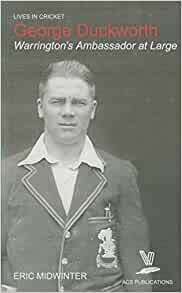George Duckworth: Warrington’s Ambassador at Large
Martin Chandler |Published: 2007
Pages: 75
Author: Midwinter, Eric
Publisher: ACS
Rating: 3.5 stars

In years gone by I must have worked too hard. These days I seem to be able to read all of the cricket books that come my way, but that certainly wasn’t the case in 2007 when this one, the third title in the then fledgling ACS Lives in Cricket series, was published. I must have been a busy man to have forgone the chance to read this life of one of the more interesting cricketers to have made his name with my beloved Red Rose, but at least I had the good sense to buy it. Sixteen years on and long out of print it seems not to have yet made its way onto the list of ACS titles available electronically via Googleplay and, sadly, print copies seem tricky to find on the second hand market.
As anyone who has been reading these pages for any length of time will know I am a great admirer of the Lives in Cricket series, generally written by men (so far anyway) who are enthusiastic amateurs rather than professional writers or historians. The man responsible for this one however is not of that ilk. Eric Midwinter, now in his nineties but still working at his art, is an accomplished writer and historian and a many times published author on a wide range of subjects.
The next ‘Life in Cricket’ will be the sixtieth to appear, and reading about the life and times of George Duckworth reinforces the point that the series has, perhaps, evolved somewhat from the intention when the series was launched. I hasten to add that that observation is in relation to the way the books are written rather than the subjects covered. These days a ‘Life in Cricket’ is very much a full biography whereas George Duckworth: Warrington’s Ambassador at Large is better described as an extended monograph.
Of course Duckworth’s role in the game, a specialist wicketkeeper, does not lend itself to the sort of match by match account that a full cricketing biography often consists of. That said I don’t suppose that is the sort of approach that Midwinter would have considered taking anyway. He does of course mention Duckworth’s cricket career, given that he was part of five County Championship winning sides and was selected for England 24 times, but what he gives on that topic is very much an overview.
Midwinter’s longevity means that, albeit after Duckworth’s days as a First Class cricketer were over, he did see him keep wicket at Old Trafford. More importantly he had the full co-operation of Duckworth’s only daughter as well as other members of the extended family and his reader is left in no doubt as to the sort of man Duckworth was, and he was certainly an interesting character.
To briefly summarise Duckworth, like so many other professional cricketers, came from humble beginnings, but unlike many he was highly intelligent. He left education earlier than he should have to help provide for his family. Known on the field primarily for his stentorian appealing coupled with a genial and generous nature he clearly didn’t have the hard edge that might have enabled him to become a wealthy man, but his intellect and personality meant he was to prove a highly capable administrator who, amongst other things, organised and managed three successful tours of sides styled as Commonwealth XI’s to the sub-continent after the war.
The result of Midwinter’s efforts is a well written tribute to Duckworth that, despite its relative brevity, tells his reader all they realistically want or need to know, and it is also a timely reminder that less really can be more, and that the ‘Midwinter approach’ is likely to remain, for many past players, an excellent way to set about authoring a record of their life in cricket.







Leave a comment